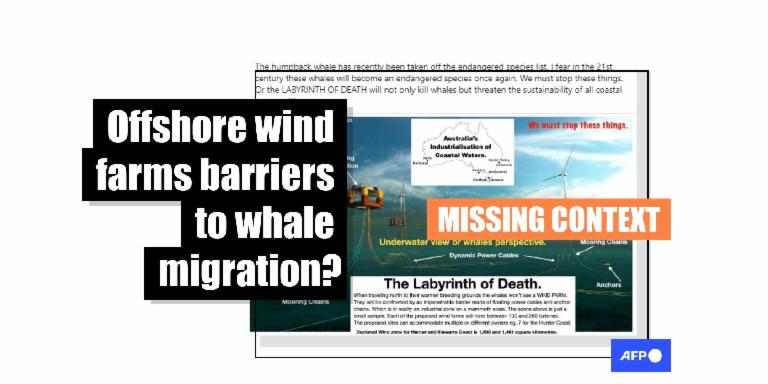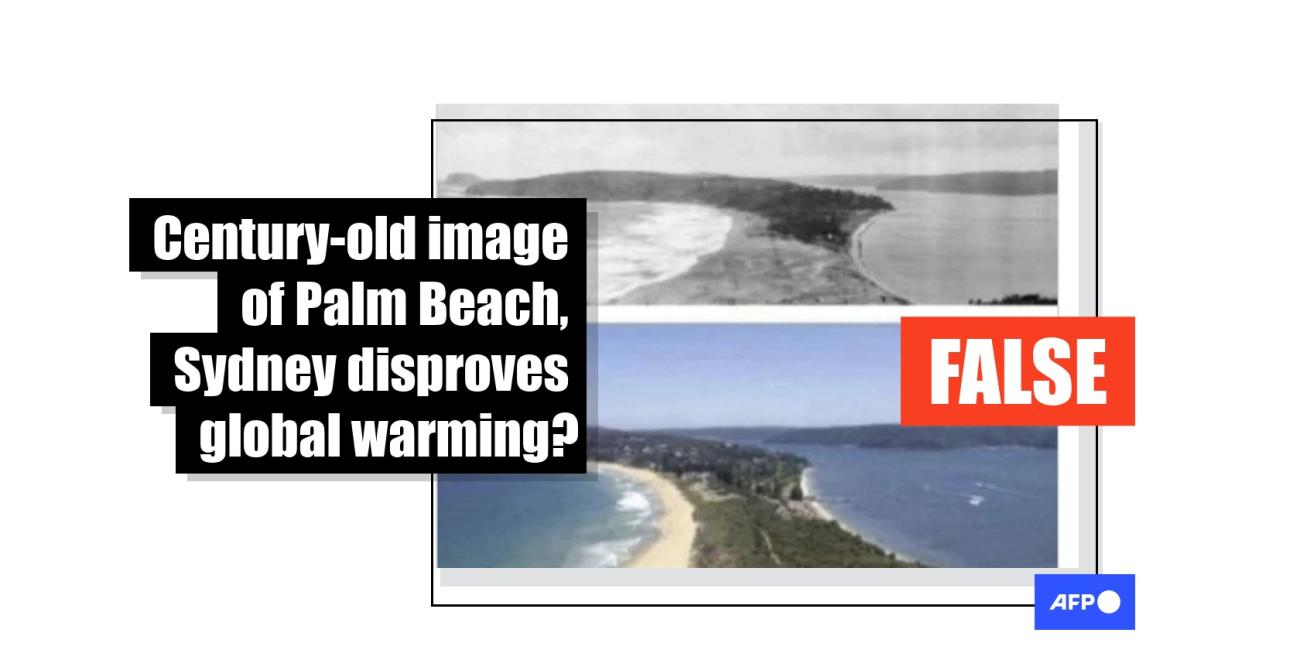
Impact on whales of offshore wind farms exaggerated by Australian opponents, experts say
- This article is more than two years old.
- Published on January 5, 2024 at 02:54
- 4 min read
- By Joseph OLBRYCHT PALMER, AFP Australia
A proposed offshore wind farm in Wollongong, a port city south of Sydney, is part of Australia's efforts to meet its target of net zero emissions by 2050 (archived here).
But the project has drawn opposition from locals and conservative politicians who claim it could kill whales (archived links here and here).
Some social media users have alleged the wind farm would amount to a "labyrinth of death" for the giant animals.

They warned that humpbacks on their annual migration route could face "impenetrable barriers" such as power cables and anchor chains attached to the turbines (archived link).
Whales around Australia migrate annually, swimming north towards warmer waters to breed. They traverse the New South Wales coastline -- which includes Wollongong -- in peak numbers around late June and July.
Similar claims about the proposed wind farm have been made elsewhere on social media including here, here, here and here.
But experts and whale welfare groups say the claims are exaggerated. While offshore wind farms do pose risks of entanglement and could alter migration pathways, safeguards can be put in place, they told AFP.
Fossil fuels have 'greater impacts'
Work on the wind farm is slated to begin off the coast of Wollongong in 2028, subject to government approval (archived link).
It would cover around 180,000 hectares and rely on the city's existing port facilities for construction and maintenance, according to a submission to Australia's Department of Climate Change, Energy, the Environment and Water (archived link).
This document says the "actual disturbance area is expected to be less than 5%" of the project's total size and the proposal has the backing of the Australian Marine Sciences Association (AMSA) (archived link).
"Offshore wind farms will have environmental impacts," AMSA has conceded, citing a variety of potential risks to whales including "barrier effects" from objects physically blocking the animals.
"However, these impacts must be considered in the context of the substantial and often greater impacts of traditional energy sources such as fossil fuels," it said.
Greenhouse gases emitted by burning fossil fuels are warming the world's oceans, affecting food sources for whales, their migration routes and ability to reproduce, according to the charity Whale and Dolphin Conservation (WDC) (archived link).
WDC spokesman Danny Grove told AFP in a November 17 email that if wind farms do pose a danger to whales, the "main threats" would come from construction and increased boat traffic, but the impact would be limited to "sensitive areas" (archived link).
Noise and entanglement
The Blue Energy Futures Lab, a research team who study the impacts of offshore wind farms, said marine species could become entangled in mooring lines, but added that these risks can be reduced by using semi-taut lines and cables.
The group said studies should be carried out to determine the best locations for the turbines in order to minimise any effect on migratory pathways.
"Whales diverting from a migration route to avoid the area either go further offshore or closer inshore," said Olaf Meynecke, a research fellow with the Coastal and Marine Research Centre at Australia's Griffith University.
To prevent this, construction and maintenance should be carried out beyond the main migration route and not between September and November when the mother whale and its calves enter the area, Meynecke told AFP.
Another potential problem is noise disturbance (archived link).
WDC spokesman Grove said sound is crucial to how whales communicate, move and find food.
But he added that "operational wind turbines are unlikely to cause a stranding as they emit low-level noise".
Wind farms involve the use of high-resolution geophysical (HRG) surveys that also produce noise, according to the Australian government (archived link).
However, the US Bureau of Ocean Energy Management and National Oceanic and Atmospheric Administration (NOAA) have found these surveys "are not likely to injure whales" (archived links here and here).
On concerns that wind farms could endanger a whale's life, the NOAA has not cited them as a cause of death in the last seven years.
There has been a spike in whale fatalities off the United States since 2017, with the bulk blamed on entanglements and ship collisions, but the agency does not attribute any of these deaths directly to wind farms (archived link).
AFP has previously debunked posts that misleadingly blamed wind farms for a spate of whale stradlings along the Mid-Atlantic coast of the United States.
One of Australia's leading marine rescue groups told AFP it had not seen evidence that wind farms are a hazard.
"To date we have not been aware of any incidents that are related to wind farms," said Steve Trikoulis, a spokesman for the Organisation for the Rescue and Research of Cetaceans, which helped authorities rescue 40 whales off New South Wales last year.
'Politically motivated'
Oceanex, the Australian firm managing the development of the proposed Wollongong turbines, said feasibility studies could take up to seven years (archived link).
They "will include Environmental Impact Assessments, marine mammal and bird life studies", spokeswoman Sarah Guilfoyle told AFP in a December 4 email.
"If the impacts to endangered species such as whales are unacceptable, then developers will not be able to build offshore wind projects," she said.
Marine policy researcher Quentin Hanich told AFP in a November 17 phone call that he doubted any science supported the arguments against the wind farm (archived link).
"Decades of research has shown no impact on whales whatsoever," he said.
Hanich heads the Fisheries Governance Research Program at the University of Wollongong and is editor-in-chief of the international journal Marine Policy (archived link).
He attributed some of the Wollongong opposition to misinformation spread by opponents of green energy.
"This strategy isn't new, where politically motivated people exploit the concerns of others," he said.
Copyright © AFP 2017-2026. Any commercial use of this content requires a subscription. Click here to find out more.
Is there content that you would like AFP to fact-check? Get in touch.
Contact us




